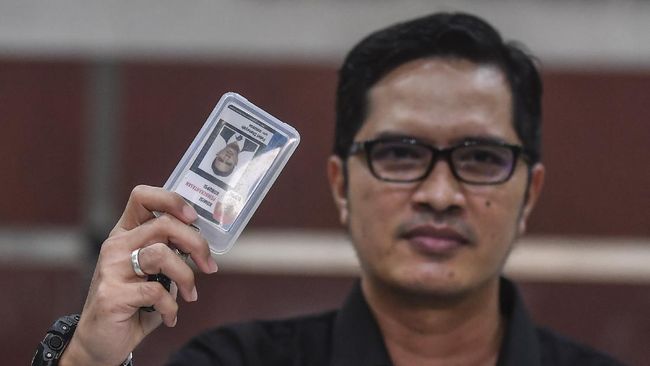Jakarta, CNN Indonesia —
Former Spokesperson for the Corruption Eradication Commission (KPK), Febri Diansyah invites the Deputy Chairperson of the KPK, Nurul Ghufron, open debate to discuss the decision of the Supreme Court (MA) which rejected the judicial review of Commission Regulation (Perkom) Number 1 of 2021 which contains the National Insight Test (TWK).
The invitation to an open debate responds to Ghufron’s view that the Supreme Court’s decision dismissed allegations of maladministration and human rights violations as found by the Ombudsman and Komnas HAM.
“Please show which part of the MK/MA Decision eliminates the findings of violations at the TWK implementation level in the @OmbudsmanRI137 report (besides the establishment of Perkom) & @KomnasHAM. I invite @Nurul_Ghufron to discuss the 2 decisions with the public and HTN/HAN academics openly,” Febri tweeted in the @febridiansyah account quoted on Saturday (11/9). He has allowed CNNIndonesia.com to quote his teasing.
Febri regretted that Ghufron as the head of the KPK could not distinguish between the decision of the Supreme Court and the Constitutional Court (MK) which assessed norms with the findings of the Indonesian Ombudsman and Komnas HAM which concluded there were maladaptive administration and human rights violations.
Ghufron answered Febri by presenting a copy of the image of the conclusion of the Indonesian Ombudsman which stated that there was maladaptation in the policy formation stage (legal basis), the TWK assessment implementation stage, and the outcome determination stage. Ghufron said that in a state of law, judges are decision makers.
“Good morning, educated Mas Febri, in a different democracy it’s normal, a thousand experts can have disagreements, but in a state of law: judge the decision maker, ORI: “perkom creation”: malaadministration, MA declares legal, formal: authority & procedure & material: substance arranged,” replied Ghufron.
Febri added that the Supreme Court and the Constitutional Court only discussed norms (formal/material), not implementation. Ghufron’s answer, he explained, ignored the findings of malaadministration.
“What about the other 2? You only talked about finding 1 and then concluded to eliminate findings 2 and 3? What logic did you use? You didn’t answer the alleged backdate document in the TWK,” said Febri.
“Not to mention the findings of @KomnasHAM regarding 11 human rights violations in the KPK TWK process. Can @Nurul_Ghufron as the KPK Leader explain which part of the Supreme Court ruled out or said there were no human rights violations in the TWK?,” he continued.
Meanwhile, Ghufron replied: “Didn’t ORI say that this is a unit that cannot be separated? Because it’s been tested since the manufacturing process? If Mas Febri usually uses a tripod to take pictures, if you have one leg broken can you stand upright? This is just my layman’s logic. not as smart as you, btw good health.”
According to Febri, Ghufron’s tripod analogy is wrong. As the head of the KPK, he asked Ghufron to understand the difference between norms and implementation.
Febri quoted the Supreme Court’s decision which read: “The Petitioners cannot be appointed as ASN not because of the enactment of Perkom 1/2021 for which a review is requested, but because of the results of the TWK assessment of the Petitioners who have TMS. [Tidak Memenuhi Syarat], while the follow-up to the results of the TWK assessment is the authority of the government.”
“If you read the Supreme Court carefully, it is said that it did not pass, not because of the implementation of Perkom1/2021, but the results of the TWK assessment which was TMS. This is the realm of implementation. As KPK Leader @Nurul_Ghufron should understand the difference between NORMA and IMPLEMENTATION. If you want to respect Put MA, don’t ” hijack” meaning,” said Febri.
The Supreme Court is known to have rejected the application for judicial review of non-active KPK employees, Yudi Purnomo and Farid Andhika, related to Perkom 1/2021. The judge considered that Perkom 1/2021 did not conflict with higher regulations: Law 19/2019, PP 41/2020, and the Constitutional Court Decision number: 70/PUU-XVII/2019, as well as the Constitutional Court Decision number: 34/PUU-XIX/2021.
(ryn/ain)
– .

